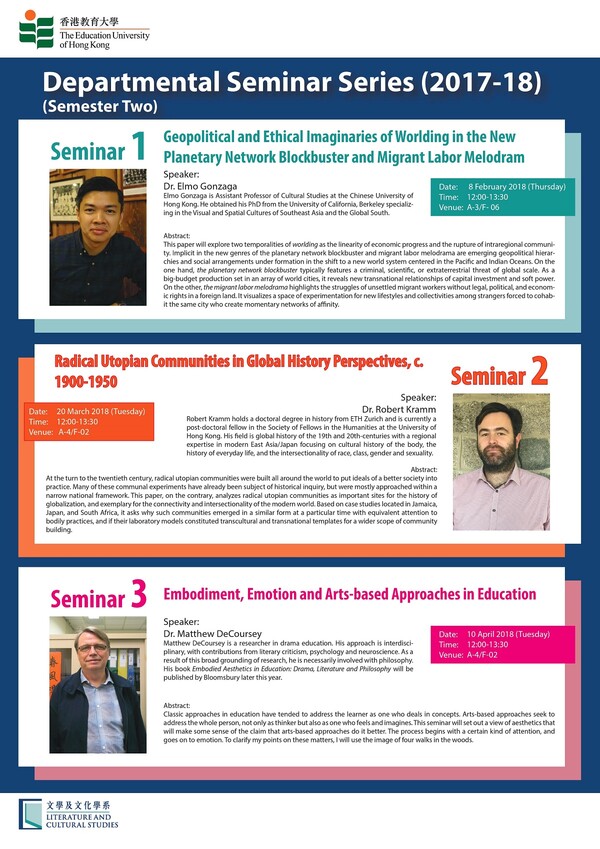Departmental Seminar Series 2017/18 (Semester Two)
- 10 Apr, 2018
- Research & Knowledge Transfer
- Department of Literature and Cultural Studies
First seminar
Speaker: Dr. Elmo Gonzaga
Elmo Gonzaga is Assistant Professor of Cultural Studies at the Chinese University of Hong Kong. He obtained his PhD from the University of California, Berkeley specializing in the Visual and Spatial Cultures of Southeast Asia and the Global South.
Title: Geopolitical and Ethical Imaginaries of Worlding in the New Planetary Network Blockbuster and Migrant Labor Melodrama
Abstract: This paper will explore two temporalities of worlding as the linearity of economic progress and the rupture of intraregional community. Implicit in the new genres of the planetary network blockbuster and migrant labor melodrama are emerging geopolitical hierarchies and social arrangements under formation in the shift to a new world system centered in the Pacific and Indian Oceans. On the one hand, the planetary network blockbuster typically features a criminal, scientific, or extraterrestrial threat of global scale. As a big-budget production set in an array of world cities, it reveals new transnational relationships of capital investment and soft power. On the other, the migrant labor melodrama highlights the struggles of unsettled migrant workers without legal, political, and economic rights in a foreign land. It visualizes a space of experimentation for new lifestyles and collectivities among strangers forced to cohabit the same city who create momentary networks of affinity.
Date: 8 February 2018 (Thursday)
Time: 12:00-13:30
Venue: A-3/F-06
Second seminar
Speaker: Dr. Robert Kramm
Robert Kramm holds a doctoral degree in history from ETH Zurich and is currently a post-doctoral fellow in the Society of Fellows in the Humanities at the University of Hong Kong. His field is global history of the 19th and 20th-centuries with a regional expertise in modern East Asia/Japan focusing on cultural history of the body, the history of everyday life, and the intersectionality of race, class, gender and sexuality.
Title: Radical Utopian Communities in Global History Perspectives, c. 1900-1950
Abstract: At the turn to the twentieth century, radical utopian communities were built all around the world to put ideals of a better society into practice. Many of these communal experiments have already been subject of historical inquiry, but were mostly approached within a narrow national framework. This paper, on the contrary, analyzes radical utopian communities as important sites for the history of globalization, and exemplary for the connectivity and intersectionality of the modern world. Based on case studies located in Jamaica, Japan, and South Africa, it asks why such communities emerged in a similar form at a particular time with equivalent attention to bodily practices, and if their laboratory models constituted transcultural and transnational templates for a wider scope of community building.
Date: 20 March 2018 (Tuesday)
Time: 12:00-13:30
Venue: A-4/F-02
Third seminar
Speaker: Dr. Matthew DeCoursey
Matthew DeCoursey is a researcher in drama education. His approach is interdisciplinary, with contributions from literary criticism, psychology and neuroscience. As a result of this broad grounding of research, he is necessarily involved with philosophy. His book Embodied Aesthetics in Education: Drama, Literature and Philosophy will be published by Bloomsbury later this year.
Title: Embodiment, Emotion and Arts-based Approaches in Education
Abstract: Classic approaches in education have tended to address the learner as one who deals in concepts. Arts-based approaches seek to address the whole person, not only as thinker but also as one who feels and imagines. This seminar will set out a view of aesthetics that will make some sense of the claim that arts-based approaches do it better. The process begins with a certain kind of attention, and goes on to emotion. To clarify my points on these matters, I will use the image of four walks in the woods.
Date: 10 April 2018 (Tuesday)
Time: 12:00-13:30
Venue: A-4/F-02




(Rev Mar 2018)(680).jpg&folder=others/)

